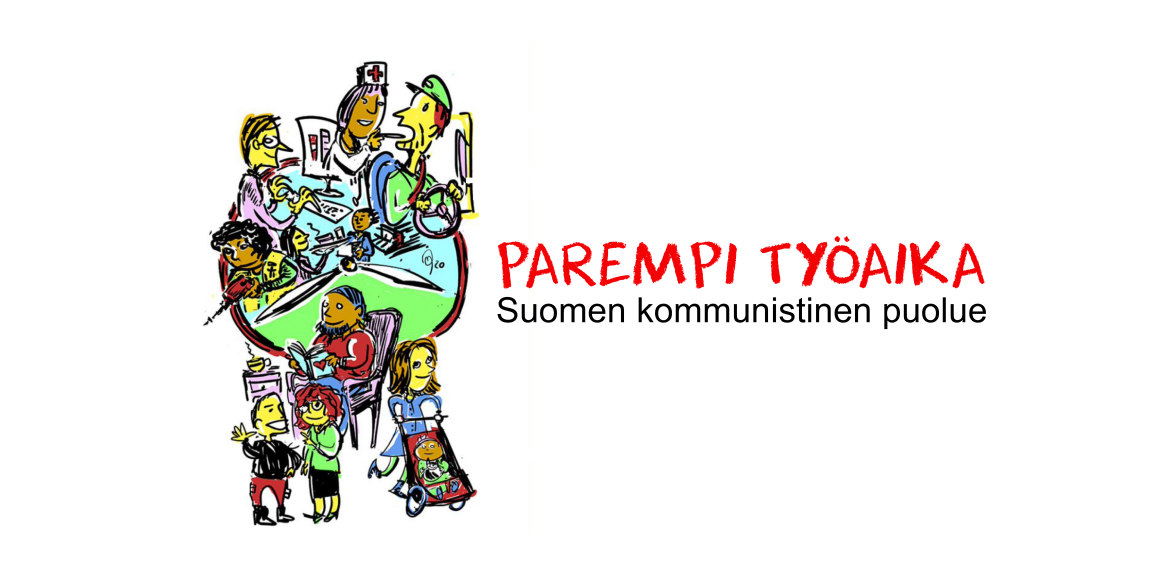CPF's initiative is better working time - more well-being and jobs
One of the key initiatives of Communist Party of Finland is better working hours, specifically the general transition to a 6-hour working day and a 30-hour working week without reducing wages. The party's legislative proposal on this topic has now been updated to reflect current times, incorporating many new experiences and justifications. Better working time surpasses current working time legislation in all respects. Read why!
The updated legislative proposal was approved at the CPF's Central Committee meeting on April 21st. The previous version of the initiative was from 2001.
The legislative proposal suggests reducing general working hours to six hours a day and 30 hours a week without reducing wages. The proposal includes an initiative for a law to maintain wage levels when general working hours are reduced. Additionally, compatible changes are proposed to the law concerning young workers. To promote the creation of new jobs, the proposal includes separate suggestions for a law on compensation to municipalities and welfare areas for reducing working hours and a law on tax reliefs related to shortening working hours for employers. The proposal also includes a suggestion to allocate training funds for vocational training to enhance readiness to take up new jobs created by the reduction of working hours.
New justifications have been added from environmental and climate perspectives, and better working hours have been examined from the perspectives of creative and knowledge work professions.
The legislative proposal describes significant benefits of the reform from the perspective of improved health and work endurance. It also justifies the implementation of shorter working hours without reducing wages economically, with calculations on productivity growth and the decreasing share of wages in GDP. New justifications have been added from environmental and climate perspectives, and better working hours have been examined from the perspectives of creative and knowledge work professions.
An Alternative to the Orpo-Purra Line
Shortening working hours is a significant alternative to the political line currently pursued by the conservative government of Orpo and Purra. The weakening of workers' rights, reinforcing wage gaps by law based on an export-driven model, and restricting freedom of opinion by limiting the right to political strikes signifies an ideological concession to the Confederation of Finnish Industries (EK) and the Federation of Finnish Entrepreneurs, whose goals have been directly copied into the government program.
Shortening working hours offers a counterbalance that emphasizes worker well-being, better recovery, and increased leisure time while also promoting productivity and employment.
Clear Benefits
Productivity growth, along with improved work well-being and endurance, has been a clear benefit observed in experiments and studies on shortening working hours. Additionally, CPF's legislative proposal considers how the benefits of AI and robotics can be utilized in companies and workplaces specifically to benefit workers.
Ongoing experiments and studies from different countries testify to the undeniable positive impacts of better working hours on worker well-being, working life, and society. When conservatives claim that cuts and austerity are necessary, bold perspectives and actions are needed for workers and those in the weakest positions.
In addition to the 6-hour workday, the goal of a four-day workweek has also emerged in the discussion. CPF's legislative proposal keeps open the possibility for sectoral or workplace-specific agreements on reducing working hours to a four-day workweek if it is deemed more functional among workers.
Examples of International Experiences
Iceland has achieved one of the most significant success stories of our time related to shortening working hours. The country conducted 35-36 hour workweek trials without reducing wages in the public sector from 2015-2019 and in public administration from 2017-2021 under the name "Better Working Time" (Betri vinnutími). Over 2,500 workers participated, and the results were favorable for workers. Productivity or job performance did not suffer. As a result of the Icelandic labor movement's struggle, this smaller, albeit significant, trial was expanded to a nationwide model in 2021, covering 86% of Iceland's workforce. Certain details, such as breaks, have been agreed upon separately locally across different professions. Workplace democracy was implemented in the planning and decision-making of the better working hours model.
In France, a law was enacted to reduce general working hours from 39 hours per week to 35 hours without reducing wages. As a result, numerous new jobs were created. The law was passed by the Jospin government, which included the French communists. Throughout different governments, there have been attempts to extend working hours multiple times, and the 35-hour workweek is continually undermined by imposing overtime. The limit on overtime hours has been raised, and overtime compensation has been cut even under a government led by the Socialist Party. Despite the weakening of labor legislation over time, workers have managed to prevent efforts to extend the legally mandated general working hours.
Germany's metalworkers' union, IG Metall, Europe's largest trade union, has successfully pushed through a 35-hour workweek without reducing wages and aims next for a 32-hour workweek. Already, thanks to IG Metall's efforts, metalworkers have the possibility of further reducing their workweek to 28 hours for two years if they have a child or an elderly or sick relative to care for. In Germany, a six-month trial of a four-day workweek without reducing wages began in 45 companies in February 2024.
Sweden's experiences with reducing working hours in hospitals disprove the claim that shortening working hours cannot be implemented in shift work.
In Sweden, positive experiences have been gained from six-hour workday trials conducted in various professions, both in the public and private sectors. The reduction has improved the quality and productivity of work, reduced employee turnover, and improved well-being. Workers have had more energy after the workday, especially improving endurance and well-being for those working in social and health sectors. Sweden's experiences with reducing working hours in hospitals disprove the claim that shortening working hours cannot be implemented in shift work.
In the UK, a large-scale study on the four-day workweek, which received significant media attention, was conducted in 2022. It demonstrated many benefits of shortening working hours, which have been observed in numerous previous experiments and studies worldwide. In the six-month study, employees' stress and fatigue decreased, and productivity increased. Most of the 61 organizations that participated in the study did not return to a five-day workweek.
Shortening working hours has also been considered or trialed in numerous other countries, with many more details provided in the legislative proposal. CPF has also discussed the topic with representatives of Chinese trade unions.
Benefits Seen in Finland as Well
In the 1990s, six-hour workdays were trialed with state support in municipalities and many industrial companies in the public sector. The working time experiment was linked to the current labor market situation, characterized by high unemployment, and job sharing was seen as one way to reduce unemployment. The trials were conducted from 1996-1999, and their results were monitored and studied by the Ministry of Labor.
The implementation methods included switching to two six-hour shifts with the 6+6 model and granting time off as entire days (four-day week) or longer breaks (free weeks). These trials showed that reducing working hours is feasible, with positive results for both employees and, in many respects, also for employers. Productivity growth was evident, and in some industrial companies, product-specific production costs decreased.
Employees have been able to utilize increased free time not only for recovery through rest but also for continuing education and skills development.
Positive observations also included the development of teamwork, employee empowerment, and a shift from hierarchical leadership to self-management. In the public sector, hiring new employees and increasing employment was a goal, which was clearly achieved. Public sector employees found the trial results positive, especially for themselves and their leisure time. Work-life balance improved, and work-related burnout decreased significantly. However, in healthcare, the trial led to reduced pay along with shorter working hours.
Despite all this, the ministry-led trials were not continued, nor were the practices of shorter working hours institutionalized or expanded socially. Instead, the Ministry of Labor practically abolished these trials, and employer resistance remained strong. Orthex Oy, which had already adopted six-hour shifts on its own initiative before the trials, was excluded from the employers' association because of this.
Trials to shorten working hours have continued and will continue to be of interest in workplaces and companies nationwide. Recently, various workplaces have organized their own trials under different frameworks and conditions. In some trials, wages were not reduced when working hours were shortened, while in others, different approaches were taken. These numerous trials have shown how productivity can be maintained or improved and significantly promoted employee well-being and work-life balance. Employees have been able to utilize increased free time not only for recovery through rest but also for continuing education and skills development. This is yet another indication of the benefits of shorter working hours for both individual workers and society as a whole.
***
CPF's Trade Unionists' Working Group promotes work on behalf of the initiative and aims to build broad labor movement cooperation to achieve better working hours. You are welcome to join the trade union group to discuss and take action, even if you are not a member of CPF. Read more about the legislative proposal and spread the word!




